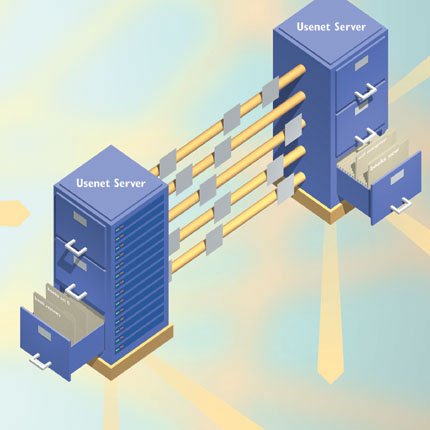Chapter 13. How Newsgroups Work
| Usenet, the world's biggest electronic discussion forum, provides a way for messages to be sent among computers across the entire Internet. People from all over the world participate in discussions on thousands of topics in specific areas of interest called newsgroups. Hundreds of different major hierarchies of newsgroups exist, such as recreation (identified by the letters "rec") and computers (identified by the letters "comp"). Within these major hierarchies are subcategories (such as rec.arts) and further subcategories (such as rec. arts .books). Individual newsgroups can cover anything from movies to parenting, ecology, sports teams, clip art, and news about Usenet itself. Not all Internet sites carry all newsgroups. An administrator at each site decides which newsgroups to carry. To participate in newsgroups, you need special software to read and respond to them. Readers are available for PC, Macintosh, and Unix computers. America Online also has its own proprietary software that lets you participate in newsgroups. Google Groups lets you read newsgroups straight from the Web at http://groups.google.com. A good newsgroup reader lets you view the discussions as threads. Threads are ongoing conversations grouped by topic. So, for example, the rec.arts.books newsgroup might have many different threads going on at one time, each discussing a different book. Many newsgroups have a list of Frequently Asked Questions, or FAQs (pronounced "facks"), associated with them. These FAQs answer common questions about the newsgroup. It's a good idea to read the FAQs before submitting questions to the newsgroup as a whole. You participate in newsgroups by reading the messages and responding to them. There are moderated and unmoderated newsgroups. In a moderated newsgroup, each message goes to a human moderator. The moderator looks at the messages, ensuring they're appropriate for the group. If they are appropriate, the messages are posted. All messages sent to an unmoderated newsgroup are automatically posted. When messages are posted, Usenet servers distribute them to other sites that carry the newsgroup. A site usually carries only the most current messages; otherwise, they would soon run out of storage space. Some sites archive, or store, old discussions. A convenient way to check newsgroups is to subscribe to those that interest you. That way, whenever you check the Usenet server, new messages in your subscribed newsgroup will be delivered to you. You can also cancel your subscription to a newsgroup if you are no longer interested in it. You can read newsgroups without subscribing to them; in that case, you must manually ask to read specific newsgroups instead of having it done automatically for you. Binary files, such as pictures and multimedia, can be posted in newsgroups. These files must be specially encoded for them to be posted. To view them, you must transfer them to your computer and then unencode them with special software. A common encoding scheme used on newsgroups is called uuencode. Most Usenet software readers have unencoding built in. |
EAN: 2147483647
Pages: 223
